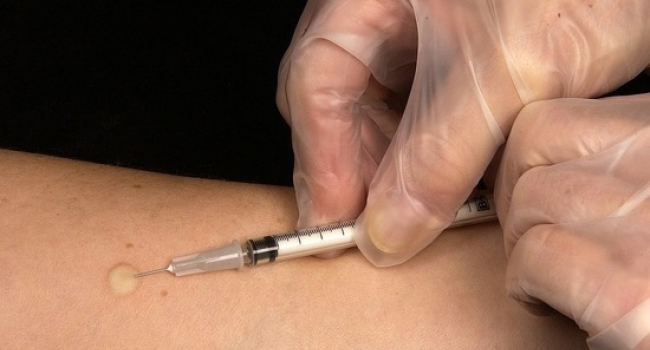- Latest news▼
-
12:16, April 19 Scientists grow human mini-lungs in lab

-
10:23, April 19 JAMA Oncology: Urine test can help rule out high-grade prostate cancer with almost 100% accuracy, study shows

-
18:00, April 18 Daily Mail: Elderly woman in China gets infected with brain-eating amoeba

-
14:19, April 18 Obesity: exercising before breakfast helps you lose weight faster

-
10:42, April 18 The Conversation: childhood trauma can cause pathological hoarding

-
08:37, April 18 Daily Mail: Satiating food reduces cravings for sweets, nutritionist says

-
18:22, April 17 First Armenian-German Conference entitled “Heart Failure Spring School”

-
08:38, April 17 Why do kids usually recover from COVID-19 more easily than adults?

-
14:37, April 16 Daily Mail: intermittent fasting is not suitable for children and women before their periods

-
16:41, April 15 Cell: in carriers of defective BRCA2 gene, sugar consumption increases cancer risk

-
15:04, April 15 305 cases of measles recorded in Armenia so far in 2024

-
14:38, April 15 Food and Environmental Virology: tea contributes to effective coronavirus control

-
12:41, April 15 Daily Mail: vitamin A, B3 and E supplements can be dangerous

-
10:56, April 15 Diabetes Care: evening physical activity is good for the heart

-
08:27, April 15 Women are more susceptible to blood loss and death during bypass surgery than men, researchers say

All materials
A killer disease can be cured

Tuberculosis remains the world's most lethal infectious killer. It claims more lives than HIV/AIDS and malaria combined. TB is also a preventable, treatable, curable disease. Clearly there is an enormous gap here. World leaders are expected to address this chasm at the United Nations next week, and they must do more than give speeches. They need to act.
Tuberculosis, an ancient malady, is caused by a bacillus, mycobacterium tuberculosis, and spread when people who are sick expel bacteria into the air, usually by coughing. Effective treatments have existed since the 1940s, alleviating in some parts of the world what was once a death sentence. A new report from the World Health Organization shows that in 2016, the global success rate of treatment was 82 percent; the incidence rate is declining; and the share of people with TB who die from it is down to 16 percent, compared with 23 percent in 2000.
Yet even with this progress, the alarming fact is that millions of infected people remain undetected and untreated. According to the WHO, there were some 10 million new cases of tuberculosis in 2017, but only about 6.4 million reported to national authorities and the WHO. That means 3.6 million people may be overlooked. Although a portion may be due to data uncertainties, there can be no doubt that real people are falling through the crackswithout quality treatment. These are often the most vulnerable populations: isolated by geography, severe poverty and social stigma. Of the 3.6 million gap, 10 countries make up most of the problem. The top three are India, Indonesia and Nigeria.
An urgent and persistent problem is the rise of TB that does not respond to the two most powerful antibioticsfor combating the disease. Here, the treatment success is much lower, and more attention needs to be given to improving diagnostics and getting people through effective treatment, which can be prolonged and arduous, as well as finding new medicines.
Overall, most resources needed to fight TB come from each country's own budget, a total of $6.9 billion this year, up from $3.3 billion in 2006. But estimates suggest more than $10 billion is needed. In the United States, the Trump administration proposed to slash funding for global health last year, but Congress has wisely, and with bipartisan support, boosted funding for fighting tuberculosis.
The effort has been neglected for too long. On Sept. 26, world leaders at the United Nations will hold the first high-level meeting on combating TB. A draft declaration contains a commitment to find and treat those in the 3.6 million gap, and, more broadly, to provide diagnosis and treatment to 40 million people with tuberculosis over the next four years. The declaration also commits the leaders to overcoming the crisis of multi-drug-resistant TB.
The words are promising, but progress against TB will require the leaders to take action when they go home, and not to again neglect a disease that can be cured.
Follow NEWS.am Medicine on Facebook and Twitter
- Video
- Event calendar
- Archive
- Most read
month
week
day
- WHO: Nigeria pioneers revolutionary meningitis vaccine 1185
- One-third of women experience menstruation-related migraines, most often during premenopause - study 1174
- Daily Mail: vitamin A, B3 and E supplements can be dangerous 1031
- Food and Environmental Virology: tea contributes to effective coronavirus control 1023
- Cell: in carriers of defective BRCA2 gene, sugar consumption increases cancer risk 996
- 305 cases of measles recorded in Armenia so far in 2024 988
- Women are more susceptible to blood loss and death during bypass surgery than men, researchers say 970
- Diabetes Care: evening physical activity is good for the heart 926
- Daily Mail: intermittent fasting is not suitable for children and women before their periods 806
- First Armenian-German Conference entitled “Heart Failure Spring School” 586
- Why do kids usually recover from COVID-19 more easily than adults? 475
- Obesity: exercising before breakfast helps you lose weight faster 475
- The Conversation: childhood trauma can cause pathological hoarding 472
- Daily Mail: Elderly woman in China gets infected with brain-eating amoeba 453
- Daily Mail: Satiating food reduces cravings for sweets, nutritionist says 450
- Find us on Facebook
- Poll





